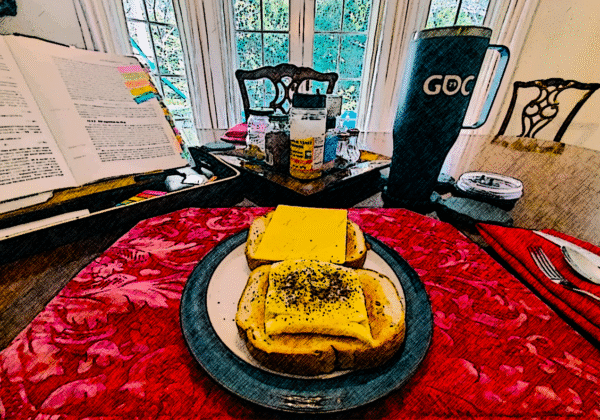
I once told my wife I was patient – and it was indeed four years from our first meeting to our marriage – but the truth of the matter is that I’m terrible at delayed gratification. I have a kazillion things I want to do and I want them all done now, now, now – but if these things I want done are MY creative projects, then I can’t really hire anyone else to do them. I’ve got to do them myself.
This is a big bottleneck if I haven’t yet learned the skill to my own satisfaction.
I’ve talked before about one of the techniques I use – reading the difficult book at the dinner table. I eat out a lot, and do a lot of my reading either in coffeehouses, at dinnertime, or sitting on a rocking chair near my house. But those places are useful for books that can be read in pieces, in any order. At the dinner table, I have one book set aside – usually the most difficult or challenging thing I am reading, a book which I take in a little bit at breakfast, a little bit at late night milk and pound cake, one bite-sized step at a time.
At the dinner table, I have read Wolfram’s A New Kind of Science and Davies’ Machine Vision and Jayne’s Probability Theory: The Logic of Science and even an old calculus textbook from college that I was convinced I had failed to fully understand on the first readthrough (hint: I hadn’t; I had inadvertently skipped one part of a chapter which unlocked a lot of calculus for me). And now I’m going through Bishop’s Pattern Recognition and Machine Learning, which has taught me much that I missed about deep learning.
Here’s the thing: having gone through (most of) two whole probability textbooks and a calculus textbook that I read to help support the probability textbooks, I no longer feel as unexpert about probability as I once did. It was my worst subject in college, hands down, but I have reached the point where I understand what I did not understand and why I didn’t understand it, I know how to solve certain problems that I care about, I know where to look to get help on problems that I can’t solve, and I have realized the need to be humble about problems that are currently beyond my framework of understanding.
[Whew! I almost said “I have learned to be humble” there. Ha! No, I don’t think you can really learn to actually be humble. You can however learn the need to be humble and then try to achieve it, but humility is one thing that it is really difficult to actually have – and if you claim you have it, you probably don’t.]
Now, I know this seems obvious. I know, I know, I know, if you read a buncha textbooks on something and are actually trying to learn, you should get better at it. But my experience is that just reading a textbook doesn’t actually make you any kind of expert. At best, it can give you a slightly better picture of the subject area. You can’t easily train yourself up for something quickly – you’ve got to build up the framework of knowledge that you can then use to actually learn the skill.
Which can lead you to despair. It feels like you read a buncha textbooks about something and end up more or less where you started, minus the time you spent reading the textbooks.
But that’s only because the process of learning something complex can indeed be a really long slog.
If you keep at it, long enough, you can make progress.
You just have to be patient … with yourself.
-the Centaur
Pictured: Pattern Recognition and Machine Learning by Bishop, sitting next to my breakfast a few days ago.